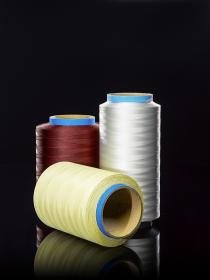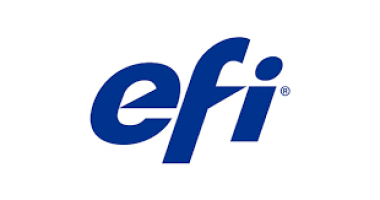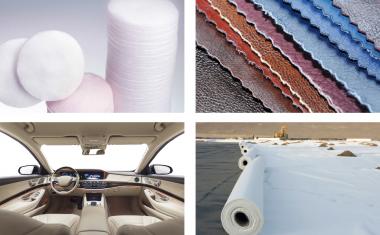Swiss Textile Machinery members at Techtextil
High-performance yarns now offer almost unlimited possibilities for replacing traditional raw materials in a vast range of technical applications. Often tailor-made, these filament yarns go way beyond the conventional idea of ‘textiles’ – finding new uses in sectors such as automotive, aviation, maritime, medical and construction, among many others.
Technical textiles are everywhere in our daily lives today, even if we may not always realize it. Some are in more obviously textile products, from sewing threads to artificial turf. But then, take cars as an example: modern vehicles are stuffed with parts made from sophisticated yarns. It’s common for producers of automotive parts now to send template material and requirement lists to Swiss Textile Machinery members, trusting their expertise and experience. Members operate development and testing centers with latest machine installations, where their experts devise customized solutions, as well as calling on the pure innovative spirit which is part of their DNA.
At the extremes
Technology drives applications beyond our current imagining in the case of Heberlein air splicers. Developed for a wide range of uses with high-strength technical fibers, they have no problems splicing aramid fibers up to 16’100 dtex, carbon up to 30’000 dtex, Dyneema up to 5’500 dtex, and glass up to 4’800 tex. Using compressed air, the splicers produce a tear-resistant, homogeneous splice of material without interfering knots.
Retech has the technology to achieve specifications for filament yarns, drawing and stretching fibers to perfection. Top heated godet rolls – many customized – are developed for high-performance fibers. Temperatures up to 400 °C can be achieved. Combining the right settings and wide speed ranges for each specific process results in unique end-products.
Fabric producers of high-end applications must avoid any quality risk. Yarn producers are well aware of this responsibility, so they use precision package winders for technical yarns, developed by Rieter’s subsidiary SSM. Taking yarns from ring twisting bobbins, its specialist finish winders can produce coarse-count technical yarns up to 50’000 dtex, offering a new level of flexibility and winding quality.
Lifestyle essentials
At first glance, motorists might fail to notice many of the technical yarns ‘hidden’ inside their cars. These products have functions such as providing stability with hardly any weight, or absorbing tensile forces at defined elongation. This kind of controlled elongation behaviour, for example, arises from the choice of textile material and the special construction of the yarns used.
Such specifications make twisting and cabling machines essential for the automotive industry. Saurer offers machines for the production of technical yarns made from a variety of feed materials in a very wide yarn count range. They are needed for vehicle products such as tire carcasses, toothed engine belts, seat belts, airbags and lorry tarpaulins.
Technical yarns also play a surprising role in our mobile devices. Tapping, scrolling and swiping are second nature for billions, with our phones and a plethora of other lifestyle essentials. Yet, how many people would know that the touch-sensitivity we take for granted on these screens is largely made possible by twisted glass fibers. Bräcker, part of Rieter’s components business, offers a selection of vertical sinter metal rings and nylon travelers for glass fiber twisting, so that mills can achieve high levels of productivity and quality.
Future unlimited
Automotive and communication technology are already important industries for Swiss Textile Machinery members, along with well-known technical textiles markets in sectors such as medical, transport and construction. Smart-wear is already noted as a field with significant potential. Naturally, members are constantly investigating other possibilities. Swiss textile machinery is already applied in energy (batteries), and plastics.
The Swiss Textile Machinery Pavilion will be at the Techtextil exhibition in Frankfurt, Germany, taking place from 21 to 24 June 2022.
Swiss Textile Machinery Association textile machinery Technical Textiles Techtextil yarn
Swiss Textile Machinery













